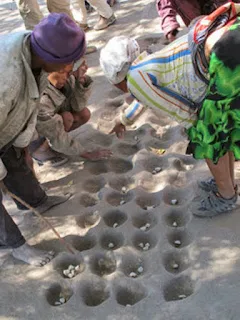The Mathematical Strategy of Mancala Oware. How This Ancient Game Develops Critical Thinking and Problem-Solving Skills.
 |
| Playing Mancala Oware |
Playing Mankala Oware helps develop valuable critical thinking and problem-solving skills in many areas of life. The game challenges players to think analytically, recognize patterns, use their memory skills, and plan strategically. Mankala Oware is an ancient African board game that requires players to think strategically and make calculated moves to outmaneuver their opponent.
To be successful in Mankala Oware, players must be able to analyze the board and anticipate their opponent's moves. They need to think several steps ahead and predict the outcome of their moves, making decisions based on logic and reasoning.
Mankala Oware requires players to recognize patterns in the arrangement of the pieces on the board. By identifying these patterns, players can anticipate their opponent's moves and plan their own strategy accordingly. Players need to remember the sequence of their moves and the location of the pieces on the board.
Mancala Oware African Math Skill Game Origins, Rules, How to Make a Board, and Objective of the Game Explained.
Mankala Oware is a traditional African board game that dates back thousands of years. The game has different variations and names in different parts of Africa, but the basic rules and gameplay are similar.
The origins of Mankala Oware are unclear, but the game is believed to have originated in ancient Egypt or Ethiopia and spread throughout Africa over time. It has been played for centuries and is still a popular game in many parts of Africa today. The folklore behind the name Oware is an Ashanti legend, which states a man and a woman wanted to have more time to play the game Oware so they decided to get married.
Mankala Oware boards are typically made from wood, although other materials such as stone, clay, or metal can be used. The boards are usually rectangular in shape and measure around 18 inches long and 6 inches wide. The board is divided into two sections, with 6 cups or "houses" in each section and a larger cup or "store" at each end.
To make a Mankala Oware board, the wood is first cut into the appropriate size and shape, and then the houses and stores are carved or drilled into the wood. The board can be left plain or decorated with paint, carvings, or other designs.
The game is played by two players, each sitting on opposite sides of the board. The board consists of 12 small cups or "houses" and two large cups or "stores," one for each player. The houses are arranged in two rows of six, with the stores at each end of the board. The game pieces, which are usually seeds or small stones, are placed in the houses at the beginning of the game.
The game's objective is to capture more seeds than your opponent and store them in your own store. Players take turns moving the seeds around the board, picking up seeds from one house and dropping them one at a time into the other houses in a specific sequence. The game ends when one player captures all of their opponent's seeds or when one player has no more moves left.
Onlookers during Mankala Oware games can vary in their level of vocalization. In some regions, it is common for spectators to get very excited and vocal during the game, shouting out suggestions or cheering for their favorite player. This can add to the excitement and energy of the game and make it a more lively and engaging experience.
In other regions, however, the game is played in a more subdued atmosphere, with spectators watching quietly and respectfully. It really depends on the culture and traditions of the region where the game is being played.
There are more than 200 versions of Mancala Oware, known by many different names in Africa, such as Kalaha in West Africa, Bao in East Africa, and Kisolo in Southern Africa. The game's name can
change from village to village, but the basic rules of winning remain the same.


